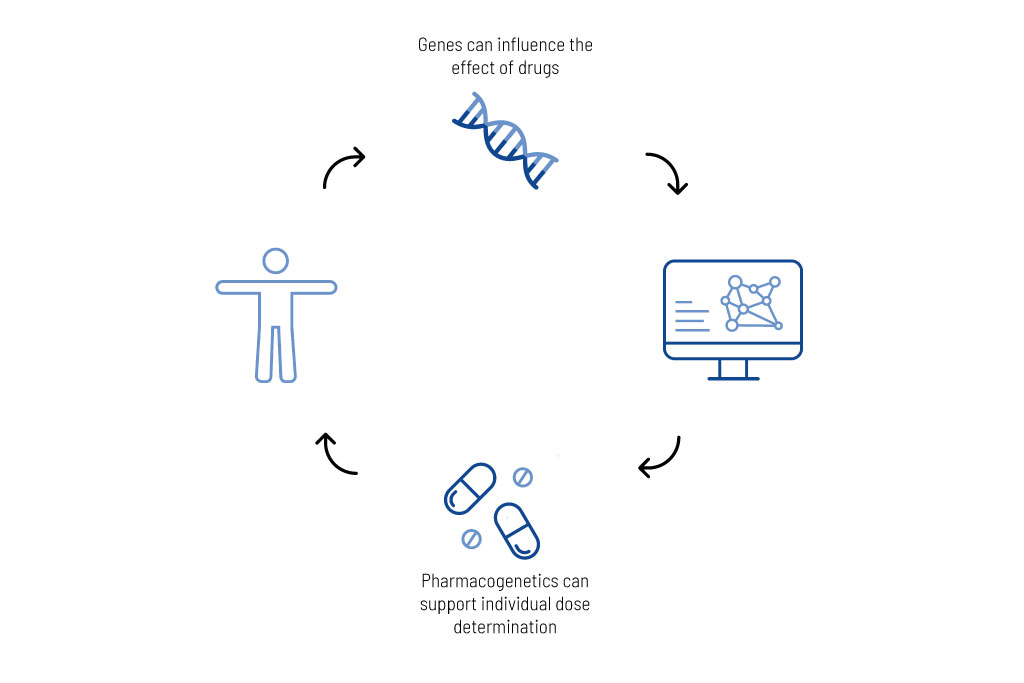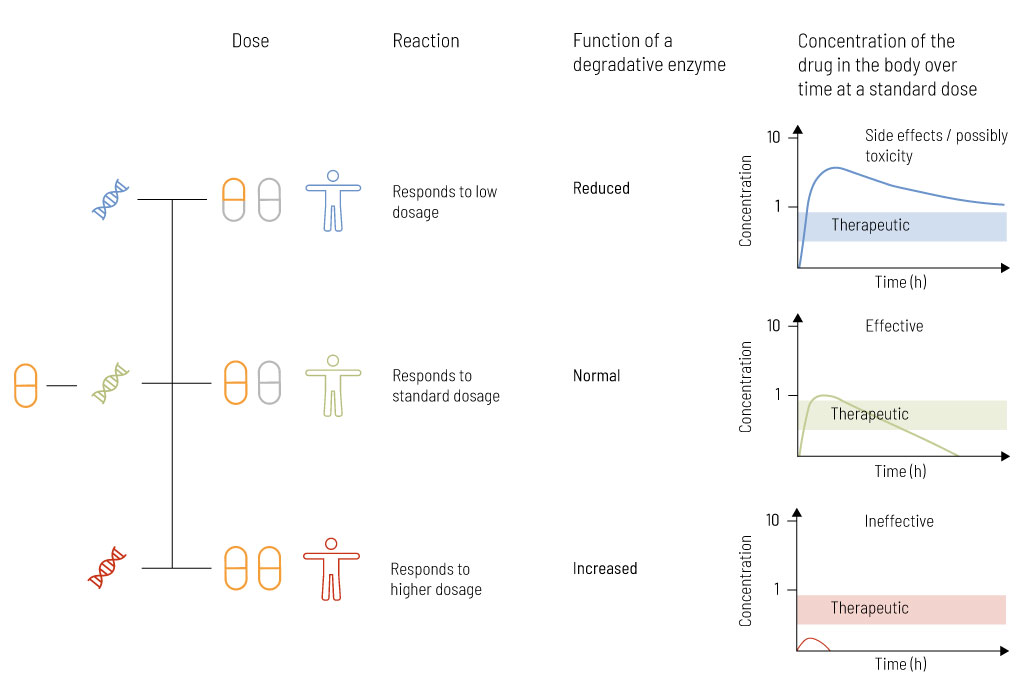A person’s genetic make-up can influence the effect and tolerability of medicines. Pharmacogenetics addresses this correlation.
With the help of the Prevention Panel, we can determine what should be considered in the context of drug therapies for people seeking advice. This can support the treating physicians in finding the individually appropriate dose.
Are you insured in Germany? Our colleagues at the Zentrum für Humangenetik Tübingen will gladly support you!
What is Pharmacogenetics?
Pharmacogenetics deals with genetic changes that influence the effect of drugs (figure 1). In other words, it examines how much of an active ingredient the individual needs to achieve a certain effect.
Genetically caused changes in proteins that are responsible for the absorption, distribution, metabolism, and excretion of substances can have an enormous influence on the efficacy and tolerability of many drugs.
The drugs that provoke individual reactions in patients include antidepressants, painkillers, neuroleptics, chemotherapeutics, AIDS drugs, thrombosis drugs, anesthetics, beta-blockers, and statins, among others.
Drugs are degraded in the liver by specific proteins, the enzymes. Enzymes are biochemical catalysators, that can favor the metabolization of drugs.
If the activity of a specific enzyme is reduced or absent, the breakdown of the active substance may be slowed down and the standard dosage may lead to an increased drug level (figure 2). This can trigger undesirable side effects, including toxicity. In this case, a lower dose of the drug should be considered. On the other hand, the lack of enzymatic activity related to drugs that are only activated by metabolization in the organism can lead to a lack of therapeutic effect. Highly increased enzyme activity can also lead to an inadequate response to therapy, for example due to rapid degradation of the active substance. In these cases, a higher dose of the drug should be considered.
The best possible effect of a drug therefore lies at an optimum in an intermediate range, which is also referred to as the therapeutic range. The corresponding individual dose should therefore be adapted to the patient’s metabolic rate to meet this therapeutic range.
Figure 2: Certain drugs don’t have the same effect on all people. Depending on genetic variation, enzymes in the drug metabolism function differently. This phenomenon can lead to the body breaking down a medication more quickly or more slowly. This can result in over- or underdosing, which can cause a reduced effect or undesirable side effects.
Field report
Isabel T., 42 years old
Lifestyle: health awareness
Result: A pharmacogenetic profile was created for Isabel T., which provides information on how she metabolizes various medications. Among other things, the genotype SLC01B1*1/*5 was analyzed. This increases the probability of certain side effects, e.g. during the therapy with statins (a drug to decrease the level of cholesterol).
Consequence: Isabel T. is sensitized through the genetic predictive test for future therapies and the treating physician can make alterations in the current medication if necessary.
“Thanks to the pharmacogenetics analysis, I now know my risk of developing side effects from statins. If I need to lower my cholesterol levels with medication later on, my physician already knows exactly what to look out for when choosing the medication and dose.”
How Does Genetic Risk Assessment Work?
With the genetic Prevention Panel in the module Pharmacogenetics, we analyze twenty-one genes that are involved in the metabolism of drugs. The treating physician can adapt the dosage of the drug individually based on the pharmacogenetic profile. With this, the risk of serious side effects or a therapy failure can be reduced.
You Are also Welcome to Take a Look at the Following Areas
Contact Us
Do you have a question, or are you interested in our service?
Diagnostic Support
We will assist you in selecting the diagnostic strategy – whether as a person seeking advice or as a physician.






